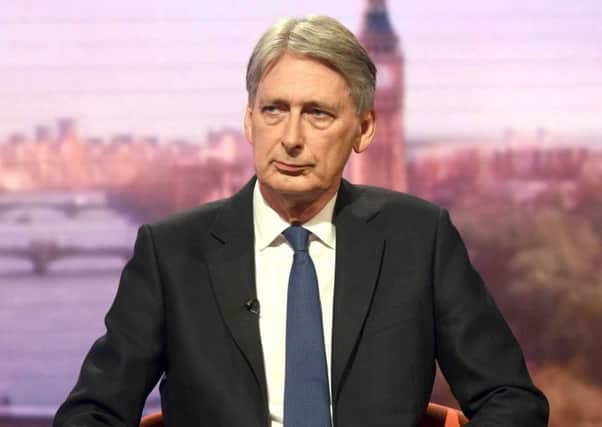UK will seek '˜a deal like no other' on Brexit


Philip Hammond, one of the strongest supporters in the cabinet of a business-friendly exit from the EU, said the UK would be leaving the European single market and the customs union.
The Chancellor admitted that a no-deal Brexit would be “very, very bad” for the British, but said a deal that would “suck the lifeblood out of our economy” was a worse prospect.
Advertisement
Hide AdAdvertisement
Hide AdMr Hammond appeared to kick the government’s 100,000 net migration target into the long grass, saying the focus after Brexit would be to “home-grow the skills we need” before seeking to significantly cut the number of workers entering the UK.
Brexit Secretary David Davis leads a nine-strong negotiating team to Brussels today calling for a “deal like no other in history” with greater access to the single market than any of the EU’s external trading partners and more freedom for UK goods and services than Turkey enjoys as a member of the customs union.
The European Commission’s chief negotiator Michel Barnier has insisted initial talks will focus on the status of EU nationals in the UK and Britons in the EU, as well as the “divorce bill” of upwards of £60 billion and the issue of the Northern Ireland border with the Republic.
But UK government officials insisted they will continue to push for talks on a comprehensive trade agreement to discussed alongside a deal on the withdrawal process.
A spokesman for the Department for Exiting the European Union said: “We believe that the withdrawal process cannot be concluded without the future relationship also being taken into account.”
Yesterday Mr Hammond said transitional arrangements lasting up to two years after the UK leaves the EU would be sought to avoid a “cliff edge” change in trading arrangements for British firms.
“What we put in place may not be a single arrangement that endures forever, it may be an arrangement which lasts for a couple of years as a temporary measure before we get to the long-term agreed status quo.
“We’re leaving the EU and because we are leaving the EU, we will be leaving the single market and, by the way, we will be leaving the customs union.
Advertisement
Hide AdAdvertisement
Hide Ad“The question is not whether we are leaving the customs union. The question is what do we put in its place in order to deliver the objectives the Prime Minister set out in her Lancaster House speech of having no hard land border in Ireland and enabling British goods to flow freely backwards and forwards across the border with the European Union?
“It’s a statement of common sense that if we are going to radically change the way we work together, we need to get there via a slope, not a cliff edge.”
Scottish Conservative leader Ruth Davidson had been among leading figures within the Conservatives and opposition parties arguing that the government’s loss of its majority should force a rethink on the approach to Brexit.
Ms Davidson called for an “open Brexit” that put the needs of the economy before cutting immigration, although a Scottish Conservative spokesman later denied suggestions that she was seeking continued membership of the single market, which requires the free movement of EU nationals.
Last week Downing Street refused to recognise the term “open Brexit”, but it was endorsed yesterday by Boris Johnson, the foreign secretary, who said the UK would not be “slamming the drawbridge on talent”.
Labour’s shadow Brexit secretary Sir Keir Starmer said the party would “leave options on the table” if it formed a government and took over negotiations in Brussels.
Sir Keir said another referendum on the terms of the UK’s Brexit deal was “not viable”, but he hinted Labour would fight to keep membership of the customs union after the divorce proceedings.
He said Mrs May had “alienated our allies in Europe” and suggested Britain could stay in the single market if it was reformed, but failed to give further detail, saying it is more important to focus on the outcome. He added: “I think the Prime Minister has got us into a complete mess. She’s got no mandate here and she’s got no authority abroad and the negotiation starts tomorrow.
Advertisement
Hide AdAdvertisement
Hide Ad“Things have to change. Her approach so far has alienated our allies in Europe, it’s weakened our position with the EU and it’s actually got us into the worst possible starting position.”
The comments came as a poll revealed that Labour voters overwhelmingly support the softest possible Brexit deal.
Supporters of Jeremy Corbyn’s party prioritise unrestricted trade over immigration controls by a margin of 64 per cent to 19 per cent, a YouGov study found.
The research, which was commissioned by the Global Future think tank, found 60 per cent of Tories, however, put migration curbs first compared to 27 per cent for trade.
Of the 35 per cent of Labour supporters who said quitting the EU motivated their vote, 47 per cent explicitly said they wanted a soft Brexit compared with 4 per cent who wanted a hard Brexit, while 27 per cent were opposed to Britain leaving at all.
Mr Davis will be accompanied at the one-day talks by senior civil servants at the Brexit department as well as officials from the Treasury and Home Office and Mark Sedwill, the Prime Minister’s national security adviser.
“Today marks the start of negotiations that will shape the future of the European Union and the United Kingdom, and the lives of our citizens,” Mr Davis said at the start of talks.
“We want both sides to emerge strong and prosperous, capable of projecting our shared European values, leading in the world, and demonstrating our resolve to protect the security of our citizens.
“I want to reiterate at the outset of these talks that the UK will remain a committed partner and ally of our friends across the continent.”